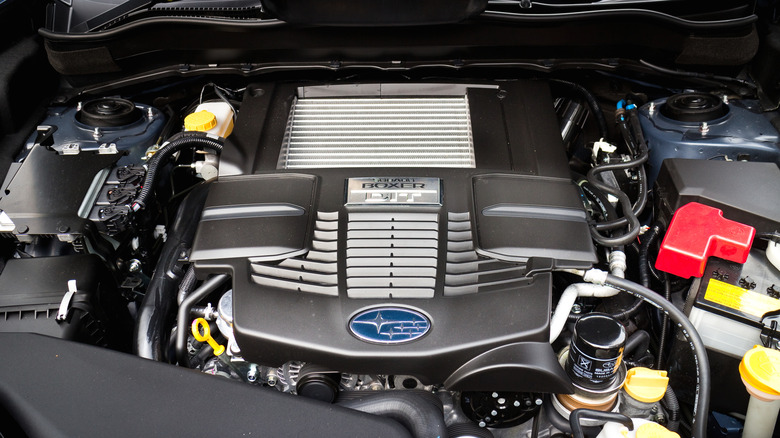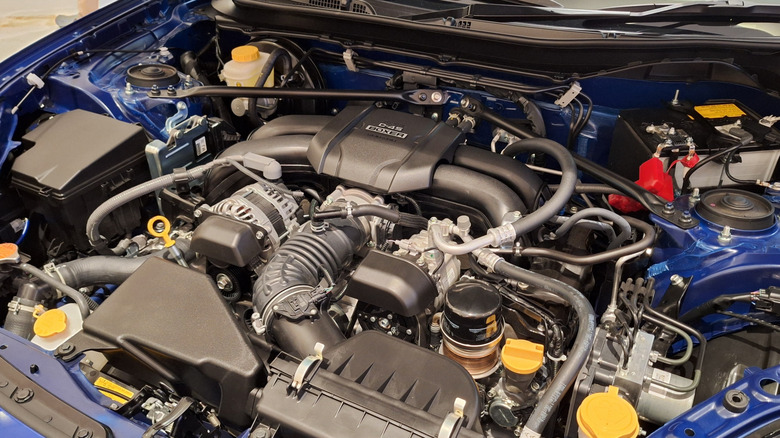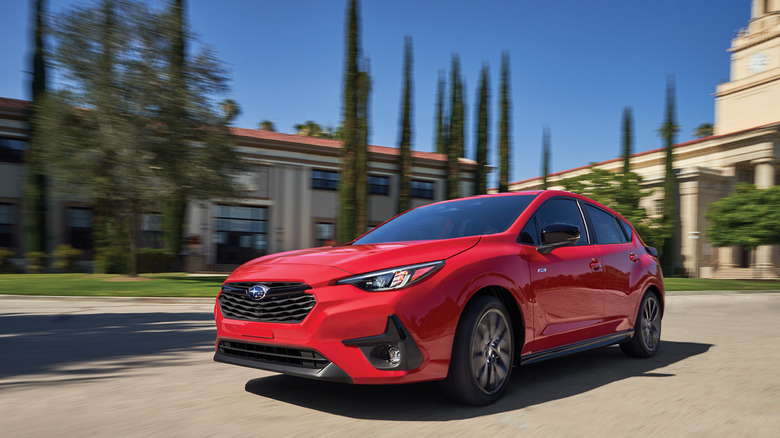Who Makes Subaru Engines & Are They Any Good? (According To Owners)
Subaru's journey as an automaker spans back over half a century, and even right back at the start, this Japanese brand was looking to get its foot into the door of the American automotive market. Things have moved on considerably now from the small rental unit in California which acted as Subaru's first US office, as now, Subaru has its own production plant in the States, where some Subaru models are made, in addition to four others situated throughout Japan — the latest being added just earlier this year.
It's at one of those Japanese plants, namely the Oizumi plant in Japan, that Subaru manufactures its own engines. This is a 59-acre facility which is situated close to Subaru's Subaruchō and Yajima plants, where the cars are built. Keeping things closer together will have obvious supply chain benefits, and building everything in-house also allows Subaru to keep a close eye on build quality and production issues. The engines and transmissions from the Oizumi factory can simply be shipped off to the neighboring facilities and bolted into the built cars.
As for whether or not the engines are good or not, the problem is, how do we define "good?" Good engines need to cover many facets, so you'll want to know whether they are costly to run, long-term reliable, and whether or not they still cater to the brand's more performance-focused enthusiasts.
Reliability, fuel economy, and maintenance costs
In order to establish how reliable Subaru engines are, it's best to look at reports and reviews on older models, as newer cars simply haven't been on the road long enough for a complete picture to be provided. CarSurvey, a site which allows owners to review cars they own, shows 348 reviews for Impreza models ranging from the 1993 to 2016 model year. Of those 348 owners, CarSurvey reports that 81% would buy another Subaru based on their Impreza ownership experience, and an average reliability score of 8.6 out of 10 was given. Those stats give a pretty impressive first impression of just how good Subaru engines are.
However, in terms of running costs, Subaru scored 6.3 — with 10 being cheap. This suggests room for improvement when it comes to maintenance, repair, and fuel costs. This data is corroborated by reports on CarComplaints that engine issues are the most common gripe of Impreza owners, with most issues occurring at 89,000 miles, and costing in the region of $2,700 to fix on average. Common complaints of this nature include head gasket failure and excessive oil consumption, with 2005, 2008, and 2012 being the most troublesome years. This data contradicts the reliability data extracted from CarSurvey, but it's worth remembering that a platform called 'CarComplaints' is likely only to attract disgruntled owners in the first place.
In terms of fuel economy, feelings are mixed. There are numerous posts on Reddit and similar sites centering around owners who are displeased with the MPG readings from their Subarus, especially from older models. However, there are also others out there who are more than pleased with the figures achieved by their cars, although typically these folk tend to pilot newer and more efficient models.
Engine Performance
When it comes to getting going, Subaru engines have a pretty well-renowned reputation. You don't win the World Rally Championship manufacturer's and driver's championship three times –- consecutively in the case of the manufacturer's championship –- without developing some impressive performing engines. However, while Impreza WRX STI rally cars are indeed legendary, this was decades ago now, so we need to establish whether or not Subaru still offers that edge in the eyes of owners.
One prospective buyer of a Crosstrek Sport took to the internet in search of reviews from owners, wondering what the performance on offer was like. The general consensus was that there are no sports cars, and can't offer the same sort of get-up-and-go as a WRX or BRZ, but they're more than fast enough, and a world away from the old 2.0-liter, CVT-equipped units in Subaru models of old.
If performance is of paramount performance, though, buyers are more likely to be interested in those aforementioned models – the BRZ and WRX – or even the WRX STI models of old, STI standing for Subaru Tecnica International, and denoting the model as a flagship performance variant. Even though the BRZ is naturally aspirated, enthusiastic owners love it, citing the instant throttle response and dreamy handling as key takeaways.
The Impreza WRX models are equally loved, but for their huge levels of grip, impressive power output, and enjoyable handling characteristics. So, in terms of performance then, it's quite clear that Subaru engines offer plenty for both enthusiasts and those who simply don't want to feel under-powered on their commute. With ownership experiences like this, it would be very hard to argue against the fact that Subarus do indeed make good engines, well suited to their customer's requirements.
Methodology
The aim of this article is not to endorse or criticize Subaru unjustly, rather, it looks to paint an honest picture of how owners genuinely feel about Subaru engines from a reliability, financial, and performance perspective. These are the three main metrics in which we have decided to judge Subaru and its engines, although where other points have been raised by owners and enthusiasts that sit outside of these categories, they have been factored into the decision making also.
For the article's research, we have scoured owner's forums, Reddit, and social media posts to establish what genuine owners have to say, rather than rely on third-party data or promotional material from Subaru themselves.



